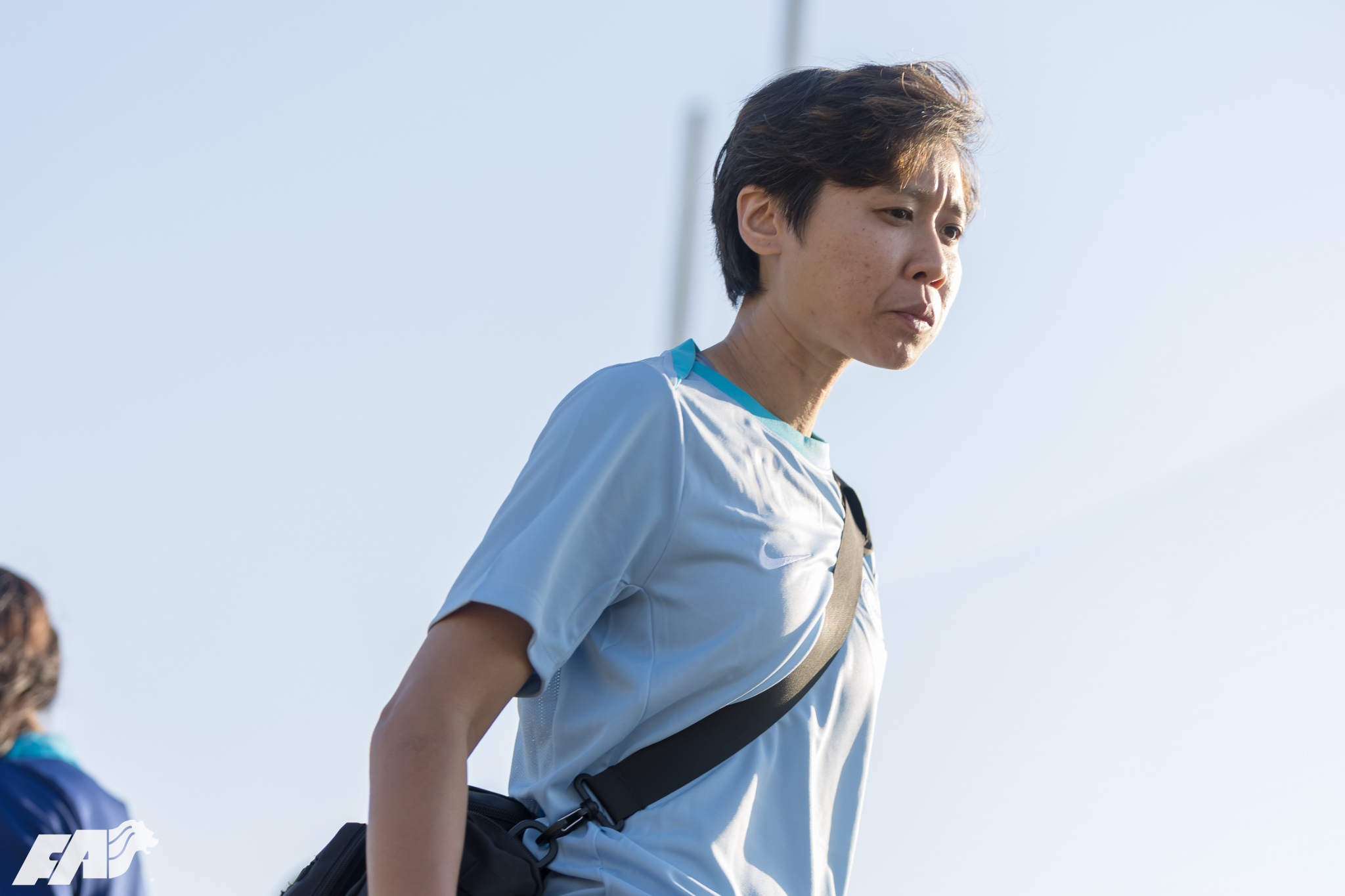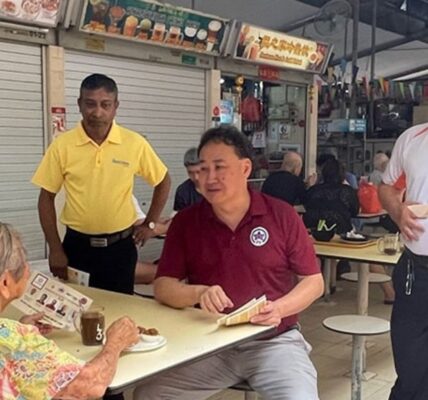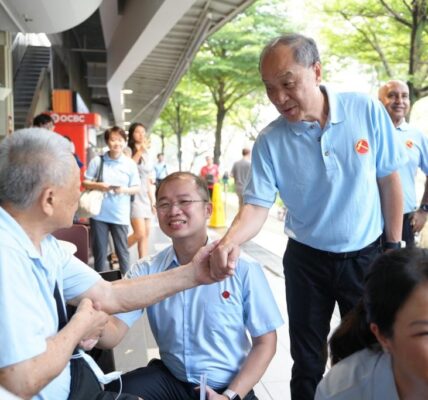In celebration of International Women’s Day, we take a deep dive into the life and times of the women in the FAS, to better understand what draws them into the game, what drives them, and just what they have to do to make a mark in what is a male-dominated Singapore football industry.
This final piece in our special three-part series penned by our former intern Chan Wei En, highlights the journey of former Lioness Captain Izyani Noorghani and her ongoing dedication to the growth of women’s football, both on and off the pitch.

As a child, Izyani Noorghani spent countless afternoons kicking a football around the void deck of her apartment block with her brothers and friends—the only girl among them. She always kept one eye out for her mother’s car, and the other on the fastest possible route back upstairs, to pretend all she had been doing the entire time, was watching television.
Football had her heart, but back then, the idea of a girl playing was often met with disapproval, so Izyani just had to find a way.
At that time, there was limited awareness on structured training sessions or proper teams for girls. She played simply because she loved the game. It was only when she joined her polytechnic football team that she had her first real opportunity to train and compete properly. That was when doors started to open—leading her to club football, her first national team call-up in 2010, and eventually, in 2017, the Lionesses’ captain’s armband.
Her journey was never straightforward. Like many female footballers in Singapore, she faced an uphill battle from the very start. Support was scarce, opportunities were limited, and the mindset around women’s football remained a constant obstacle.
“It was a journey,” Izyani reflected. “From kicking a ball at a void deck with no proper training, setup, or background, to pushing through every challenge, playing for a club, getting called up, and then captaining the national team. It was something that nobody could give me—I had to find a way for myself.”
A struggle beyond the game

Izyani quickly recognised that while talent and dedication were essential, there was a bigger challenge ahead—transforming the perception of women’s football in Singapore. Traditionally, the sport had been overshadowed by its male counterpart, but Izyani was determined to change that mindset.
“The biggest challenge was in changing how people viewed women’s football,” she said. “We knew the world was evolving, and I believed it was time for our mindset to reflect that change.”
Despite the challenges, Izyani and her teammates continued to press on. The drive for excellence was clear, but there were still areas in need of growth. Financial support remained limited, and many players balanced their passion for the game with full-time jobs or studies. Some even took on part-time work to help manage costs.
“We weren’t paid to play, but we played because of our love for the sport,” Izyani explained. “Although there were challenges, we pushed through—whether it was finding ways to cover personal expenses or seeking out treatment for injuries, we found a way.”
The path ahead was not always easy, but Izyani was optimistic. She noted that other countries were making significant strides in developing women’s football, and she believed that Singapore could do the same with the right focus and investment.
“Back in 1993, we secured a silver medal in the SEA Games, and it showed the potential we had. We have talented players today, and with better support and planning, we can elevate the game even further,” Izyani said. “With the right resources and dedication, we can definitely make good progress.”
A different way into the game

After nearly a decade of dedicated service to the national team, Izyani faced a challenging decision: stepping away from playing the game she loved to focus on her future. It was not due to a loss of passion, but rather a desire to build something for herself beyond the pitch.
“I still wanted to contribute, but I knew it was time to focus on my future. I spoke to Julie (Teo) about retiring, and she encouraged me to stay and keep playing,” explained Izyani.
Julie is a long-time supporter of the women’s game who has served in various roles, and currently chairs the FAS’ women’s football committee.
“But I was ready for a new challenge,” continued Izyani. “One where I could still make a difference from behind the scenes.”
Her transition from player to team manager provided a fresh perspective on the game. Now, Izyani ensures the youth teams have the resources and support they need. She coordinated logistics, organised football festivals, and advocated for better conditions for the players.
“It wasn’t a huge leap,” she said. “As captain, I was already bringing people together. Now, I just have more behind-the-scenes responsibilities.”
Her commitment to the team was evident. Younger players affectionately called her “Mummy Yani,” a sign of the deep trust and respect she had earned.
“I felt like a big sister to them, with added responsibilities,” she said with a smile. “It was rewarding to be someone they could rely on, and the trust we had made the work even more meaningful.”
Pushing for progress

Even as she moved into management and later sports training, Izyani continued to see opportunities for growth in women’s football. While there were improvements, she recognised that more needed to be done to push the sport forward.
“It wasn’t perfect yet, but there was so much potential,” she reflected. “Women’s football deserved to be prioritised just as much as the men’s game. It was time for a real focus on development.”
Izyani believed that creating a structured pathway to professionalism was essential, and she remained determined to see it through. She advocated for semi-professional leagues that could grow into fully professional football careers, recognising that such growth required collective effort and investment.
“The talent is there,” she said with conviction. “But we needed the right support to unlock its full potential.”
She also recalled the challenges in securing basic resources for youth tournaments, but she never lost hope.
“It wasn’t always easy, but we made it work,” she said. “Even with limited support, the passion and dedication were undeniable.”
Izyani pointed to the global shift in women’s football as a beacon of hope.
“Look at the past four (FIFA) Women’s World Cups,” she noted. “They’ve been monumental in changing people’s perceptions. The impact on the game has been incredible. Other countries are advancing, and I believe Singapore can take those same steps with the right focus and investment.”
Though progress had been slow, Izyani remained hopeful that with continued effort, Singapore could catch up. “It’s not about blaming anyone,” she explained. “It’s about working together to create a brighter future for the game. We’re all on this journey, and the possibilities are endless – we just need to find the way that works for us.”



